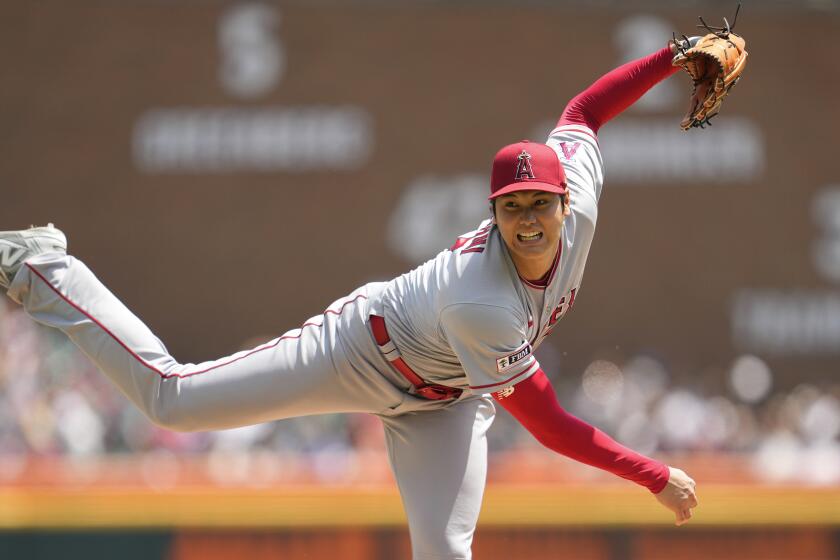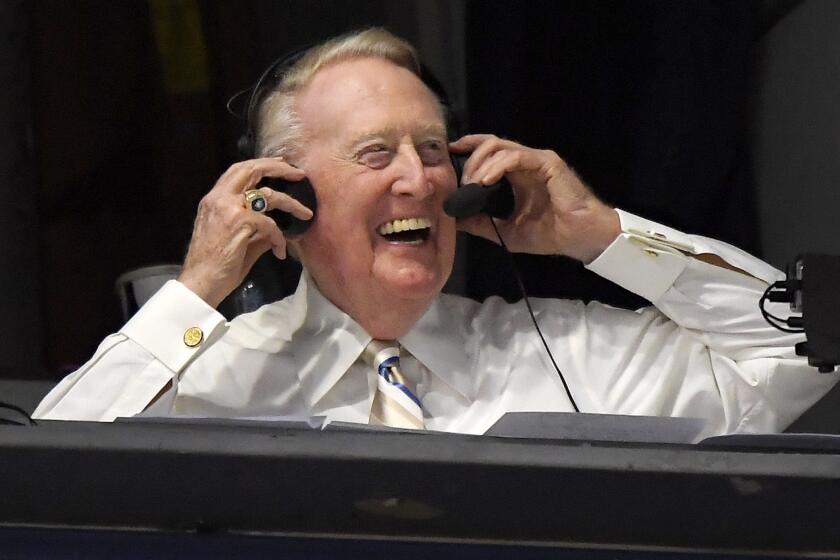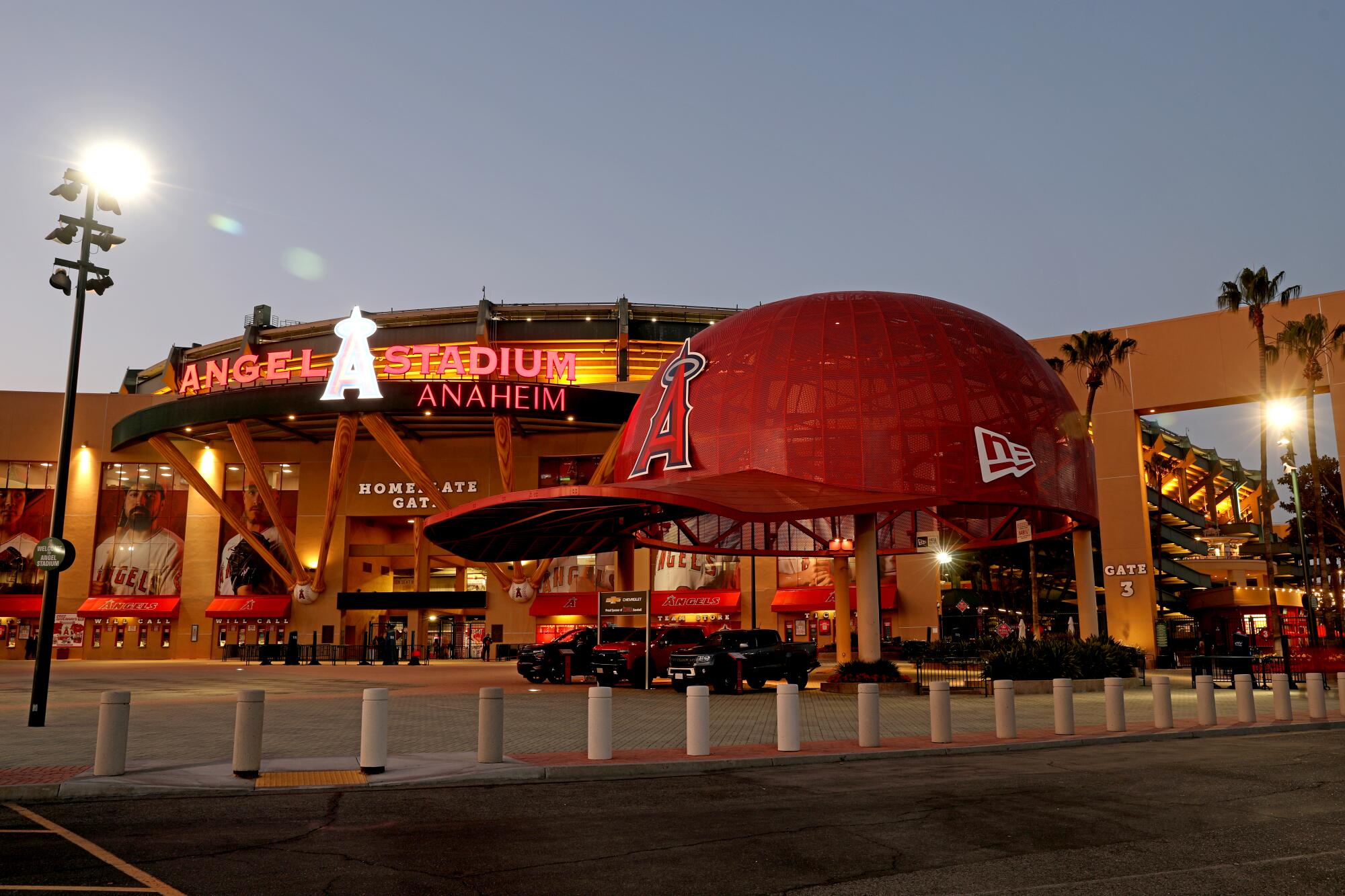
- Share via
When Angels and Detroit Tigers fans turned on their televisions or opened their MLB TV apps to watch a game between the teams on July 25, they were met with technical difficulties. A power outage affecting the broadcast trucks left both team broadcasts without any video or proper audio capability.
For Tigers fans, this meant either listening to the TV broadcasters without a picture — just a “We are experiencing technical difficulties” graphic — or simply listening to the radio broadcast. Except for a nonfunctional video monitor that Tigers radio announcer Dan Dickerson likes to use, he and his partner were able to call the game right in front of them without issue.
Meanwhile, on the Angels radio broadcast, play-by-play announcer Terry Smith and color commentator Mark Langston had to explain to listeners that their announcing might sound off. The duo were calling the game off the All-9 camera feed, the only one accessible to them for the first 35 minutes of the game because of the outages.
“Just to paint the picture for you,” Smith explained over the broadcast, “when we’re in the upper deck of any stadium right behind home plate, we’d be able to see the entire field from home plate all the way out to dead center, the corner outfielders, as well. So that’s the view we have right now. So it does make it very difficult when the ball is hit, because we’re so removed from everything, to even see if number one, it is hit, and number two, where did it go. And we’re relying on the movement of the fielders right now.”
It’s a difficulty Smith and Langston would not have had if they actually were at Comerica Park.
The Angels are one of just two MLB teams that do their away game radio broadcasts remotely. Smith and Langston — who have worked together since the 2012 season — call road games from Anaheim by watching the Bally Sports West video feeds. So calling that game in Detroit while the broadcast feeds were down meant staring at a feed in which everyone on the field looks like ants.
A Bally Sports feed returned in the second inning, with television broadcasters for both teams continuing to call the game with audio that sounded as if it was coming from a cellphone. The broadcasts were not back to normal until about the seventh inning, Dickerson recalled.
Shohei Ohtani throws a complete game, one-hit shutout in Game 1, then hits two home runs in Game 2 of a doubleheader sweep over the Detroit Tigers.
“Did [Terry and Mark] even have a broadcast?” Dickerson asked in an interview with The Times.
After learning how Smith and Langston had to call the game while the feeds were down, Dickerson was stunned.
“They tried to call a game from an All-9? Oh my God,” he said and let out a chuckle.
“You can’t see where the ball is put in play. If they called seven innings off an All-9, they deserve combat pay. That’s nearly impossible to do.”
During the COVID-shortened 2020 season, neither radio nor television broadcasters were traveling. Restrictions put in place to limit possible exposure to and the spread of the coronavirus kept fans from ballparks, writers socially distanced, clubhouses closed to media, and broadcasters trying to call games either from empty ballparks or their homes.
But stations and teams realized there were missing elements and added difficulties for broadcasters with remote setups and as vaccinations increased and restrictions eased, baseball broadcasts gradually returned to normal.
Well, almost.
Before this season, Angels owner Arte Moreno told reporters at spring training that Smith and Langston, who work for the team-owned radio station, KLAA 830, would continue to call road games from Anaheim, because the “economics” don’t change the experience.
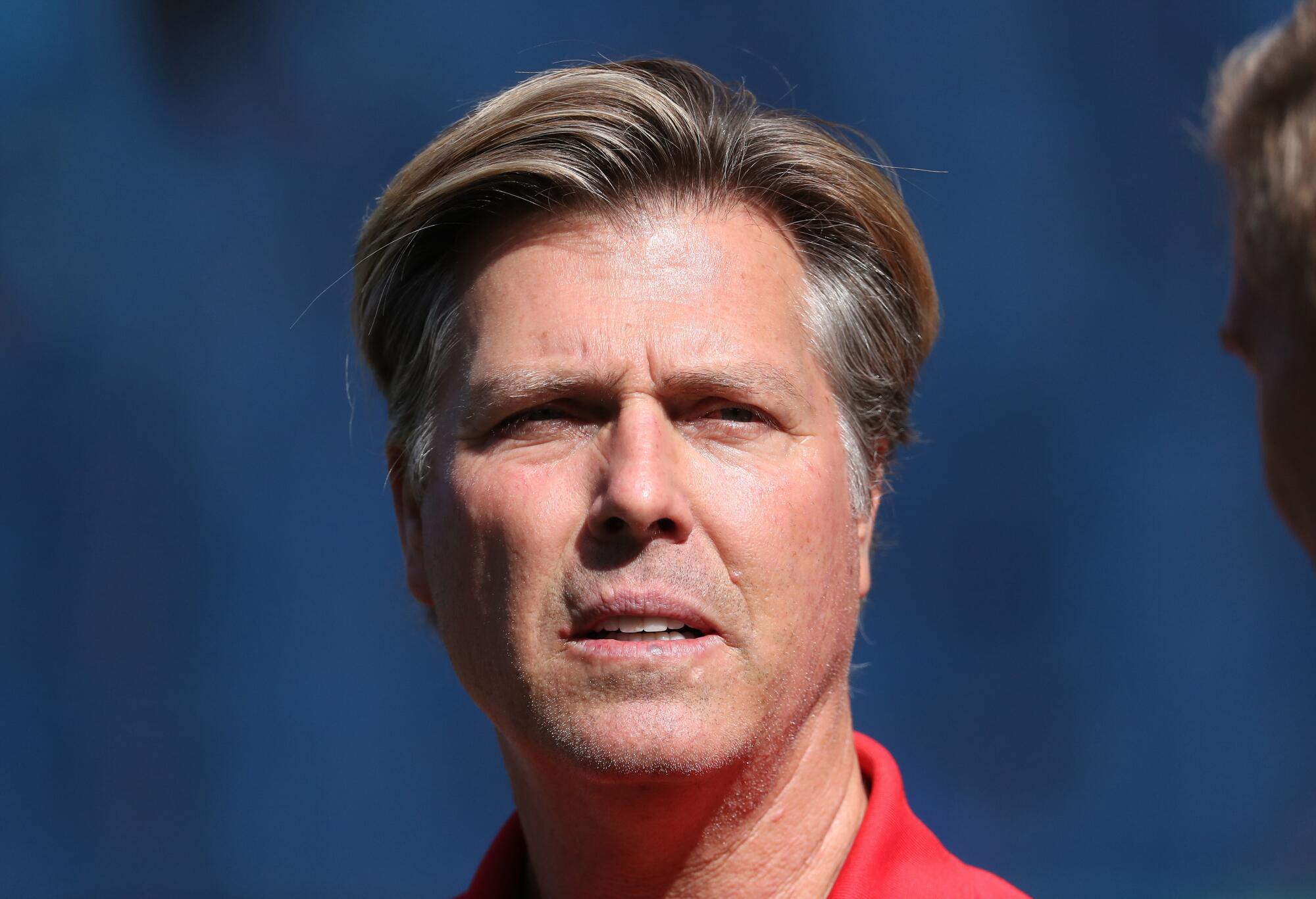
They’ve called games remotely even when the Angels played in Petco Park in San Diego and at Dodger Stadium last month.
Twenty-eight teams resumed sending their radio announcers to away games this season. Only the Angels and Toronto Blue Jays did not.
Even the Oakland Athletics — who have the lowest payroll and attendance in the majors and whose departure from the Bay Area seems all but certain — still travel their radio announcers.
The Angels declined comment on the status of their radio broadcasts and did not make Smith and Langston available for an interview.
“I just think it’s a mistake and there’s a reason that only two teams are doing it,” said Suzyn Waldman, the longtime New York Yankees radio color commentator. “It’s not the Pittsburgh Pirates, it’s not the Tampa Bay Rays, it’s not the Kansas City Royals. So someone is making a decision based on something that I don’t think is important and shouldn’t be part of it.”
What makes the decision even more curious is the fact that both teams feature some of the most exciting players in the game — the Angels with Shohei Ohtani and Mike Trout and the Blue Jays with Vladimir Guerrero Jr. and Bo Bichette.
Vin Scully, voice of the Dodgers for more than six decades, died Tuesday
Also, both teams are chasing playoff spots. Entering Saturday’s action, the Angels (60-63) were 7½ games behind Seattle for the final wild-card spot in the American League, with Toronto (67-56) a half-game behind the Mariners.
The Times spoke to multiple radio broadcasters across MLB, and they all talked about how access to a team — its players, coaches, manager — at home and on the road and to experience live games in real time are what make it possible to do their jobs to the greatest extent of their abilities.
“I feel so badly for Angel fans that they don’t get the real story from an incredible broadcast team that Terry Smith and Mark Langston are, that they don’t have that luxury to help share,” Minnesota Twins radio announcer Cory Provus said. “This amazing team that features two of the greatest players to ever play the game and only be able to tell, really, the real story for 81 games is a joke.”
The importance of radio broadcasters can’t be overstated. It’s why fans grow nostalgic about broadcasters like Vin Scully and Harry Caray and loyal to Waldman, the first woman to become a full-time color commentator for an MLB team. It’s why game highlights often air on TV or are shared on social media with the audio of the radio call.
“Everyone will remember their radio announcers growing up,” Waldman said. “There are always a thousand television announcers and I understand that’s where the money is, but your heart and your soul are in your radio announcers.”
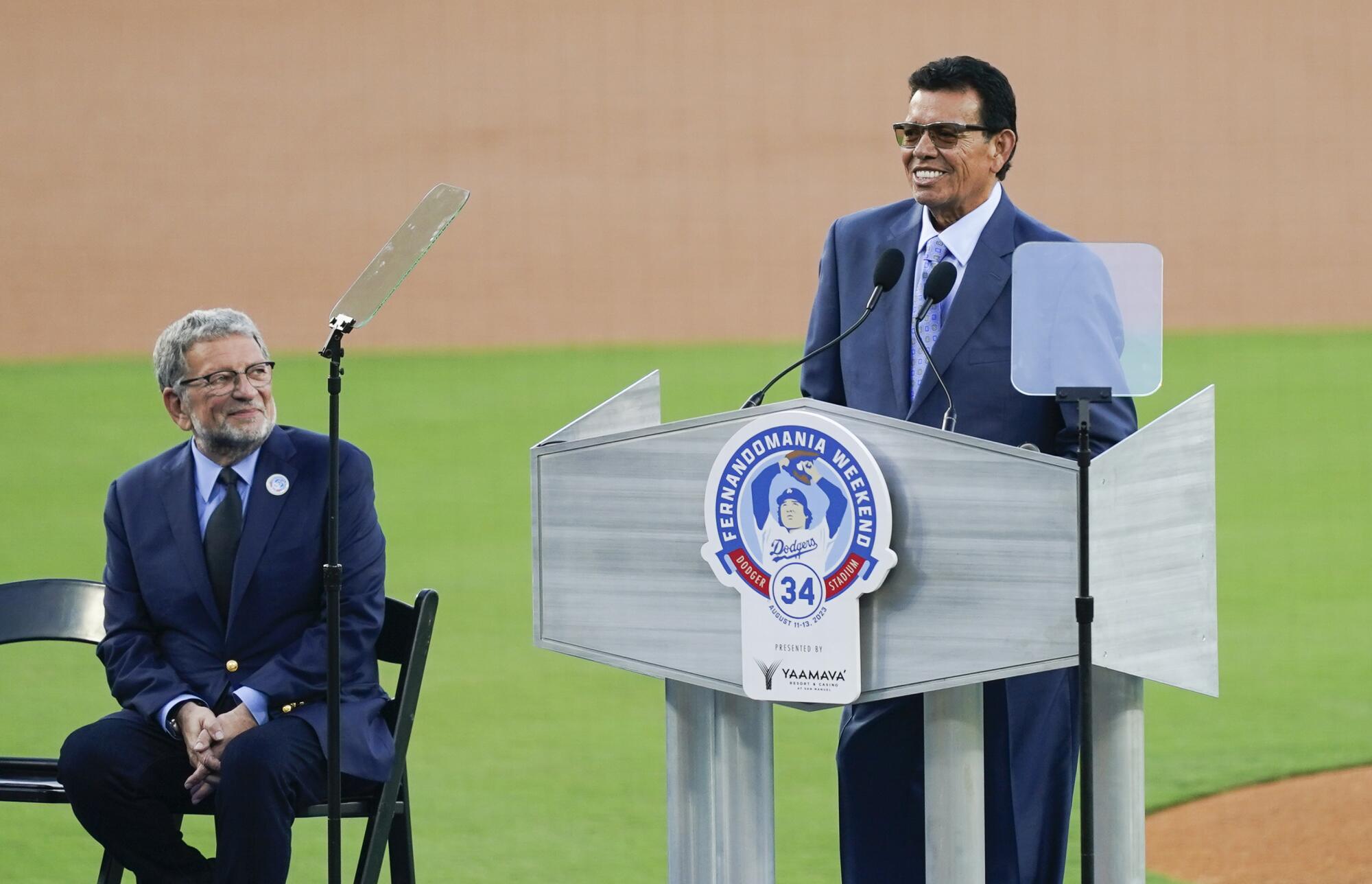
The pandemic altered the landscape for everyone in MLB, radio broadcasters included. Dodgers radio play-by-play announcer Charley Steiner said the experience of trying to call a game during that 2020 season — surrounded by television and computer monitors displaying feeds from a ballpark far away — felt incomplete.
“It’s like taking a walk,” Steiner said. “You can take a walk around your house. [But] you go outside, you breathe the fresh air and you smell the smells.
“And that’s what we on the radio do for the audience. This is what’s happening here, now, at this moment. You can tell them how cold it is, what it feels like, or the rain is beating down. It’s really hard to get into that vitally important minutia if you’re not there.”
There was concern among broadcasters that a similar setup might remain for future seasons, calling games in the home ballpark but not traveling.
“It’s like taking a walk. You can take a walk around your house. [But] you go outside, you breathe the fresh air and you smell the smells. And that’s what we on the radio do for the audience.”
— Charley Steiner, Dodgers broadcaster, on broadcasting games in person versus remotely
“Fortunately that didn’t really happen,” Robert Ford, the Houston Astros radio play-by-play announcer, said.
Added Waldman: “That’s what I was afraid of, that this was gonna stay and that a lot of teams were going to realize that ‘we can save such and such amount of money and in five years no one will know the difference.’”
MLB encourages announcers to travel, though it’s not required.
In February, the Blue Jays’ radio rights holder, Sportsnet, confirmed its plans not to send lead play-by-play voice Ben Wagner on the road. Wagner, who sometimes is joined by a color analyst, was permitted to travel for about the final third of the Blue Jays’ schedule last season in the midst of a playoff chase.
Sportsnet, which is owned by Rogers, the same company that owns the team, declined The Times’ request to speak to Wagner.
Asked why Sportsnet was sticking with the remote broadcast model, whether it had plans to change that for future seasons and if it would send radio broadcasters on the road for playoff games, a spokesperson sent The Times the following statement: “We have been successfully producing remote radio broadcasts for Blue Jays away games for a couple of seasons now and will continue with this approach.”
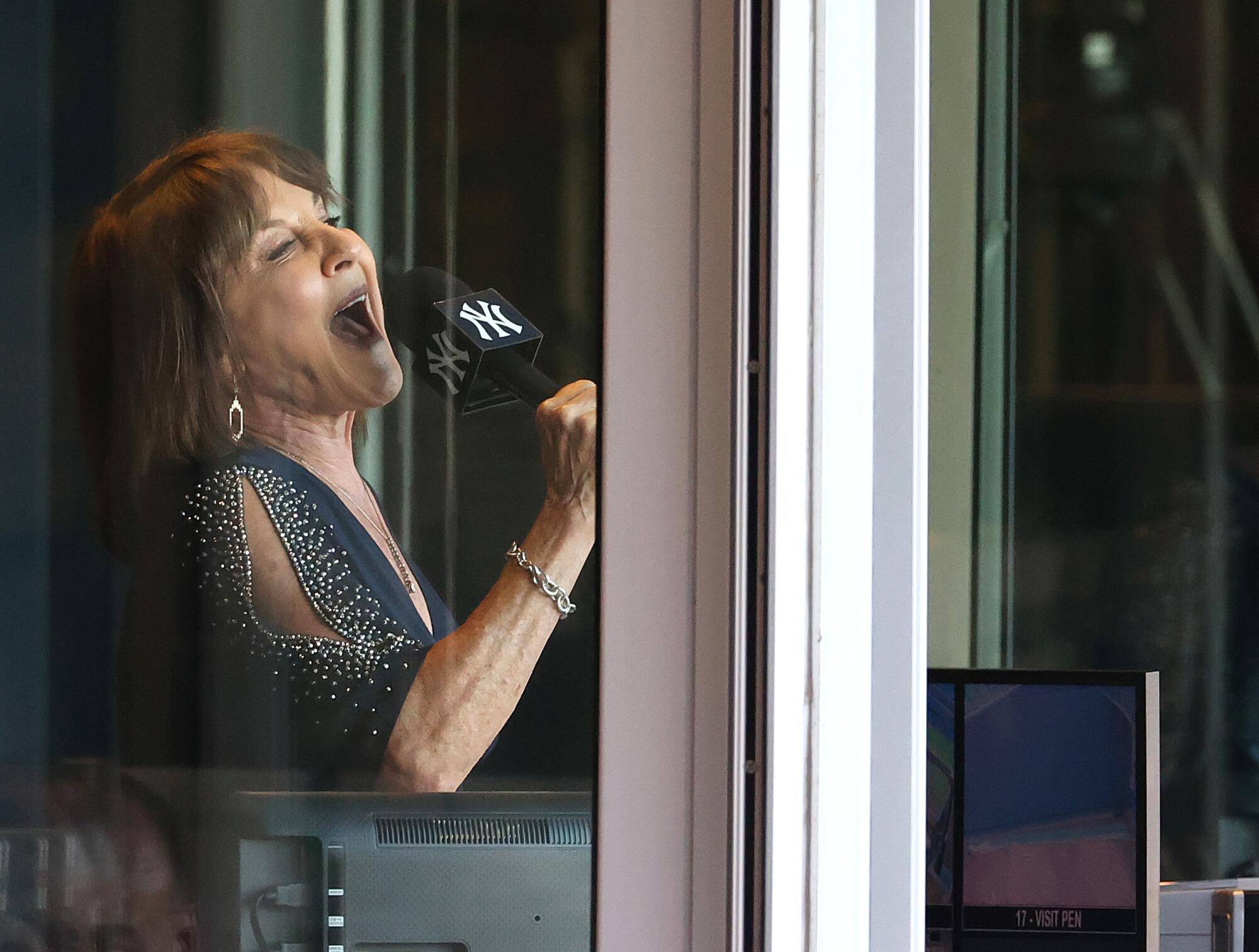
One industry source estimates that the cost of sending one play-by-play announcer, one color commentator and one engineer on the road for the entire season is about $58,000 for hotel rooms. Broadcasters typically travel on the team’s charter, which eliminates a cost for airfare or bus fare. Per diems for food, on the high-end could amount to $100 per day, according to another industry source.
“It’s disgraceful that Terry Smith and Ben Wagner — he was a guy doing triple-A for a long time and finally got his big league break to call Toronto Blue Jays baseball and what a time to join that team,” Provus said before adding: “If they say it’s a financial reason, then get out of the business because if you think traveling your radio team is going to make or break your profit, then your financial planning is way off the mark.”
To Smith and Langston’s credit, as with their remote work all season, the broadcast in Detroit did not sound amiss. To the casual listener, Smith and Langston’s calls sounded as normal as their other remote broadcasts have. Save for some delayed reaction to plays in progress, the duo put together a decent broadcast for Angels fans.
“Other than one play [later in the game], there was a drive to [Mickey] Moniak,” said Wes Cummings, 33, from Tustin. “And the way that Terry was describing it, I was kinda sitting there, waiting. It just seemed off. But that was the only play that I can think of that stood out that was like ‘hey, why’d it take so long for Terry to call that?’ Other than that, the back and forth between him and Mark seemed right on.”
The Angels radio broadcast itself, which typically also pumps in ambient and crowd noise similar to what’s heard over the Bally feeds to layer under the broadcasters’ voices, was not as easy to hear as usual. Listeners noticed.
Angels broadcaster Mark Langston was healthy, he assured reporters Sunday. The cardiac event that he amazingly survived has changed his life, he said.
Said James Gonzales, 33, who lives in Oceanside: “I know they had some difficulty with the crowd noise from whatever feed they had … and all they had was a little crowd noise, like it was really turned down.”
Listeners of the Angels’ remote radio broadcasts this season so far have been spared an experience similar to the one the Blue Jays radio broadcast experienced during opening series with the St. Louis Cardinals.
During the remote broadcast, a fire alarm blared for about 10 minutes around the studio where Wagner was calling the game — and over the broadcast.
One fan tweeted: “.@Sportsnet & @GregSansone, did you know that if you actually sent your #BlueJays Radio broadcasters on the road with the team, we would not be having to endure a non-stop fire alarm during the broadcast? Oh, and #BlueJays radio wouldn’t also be an international embarrassment.”
With Bally Sports’ parent company declaring bankruptcy, fans of the Kings, Ducks and the Angels might have to change how they access game broadcasts.
It’s just another reason broadcasters who navigated calling games remotely are more than happy to be at the ballpark this season, and critical of the teams keeping their announcers at home.
“At this stage, hopefully post-pandemic, it’s quite frankly inexcusable, because having done [remote broadcasts], and knowing the limitations, there is nothing like being there,” said Howie Rose, who has been the lead radio play-by-play voice for the New York Mets since 2006.
Radio always has seemed to lend itself to the natural flow of a baseball game and its consumer convenience makes listening to a game over the radio quite seamless. Listeners can pick up a radio broadcast over the car radio or a portable one, or over free online streams. Many stations also have a free-to-use app for your phone.
“Baseball, I’ve always thought of as a radio sport,” Waldman said. “Not everyone’s gonna sit down for three hours and watch television. You can take a radio with you, or your app now, you’re sitting in the car, you hear those voices and it’s the sound of summer.”
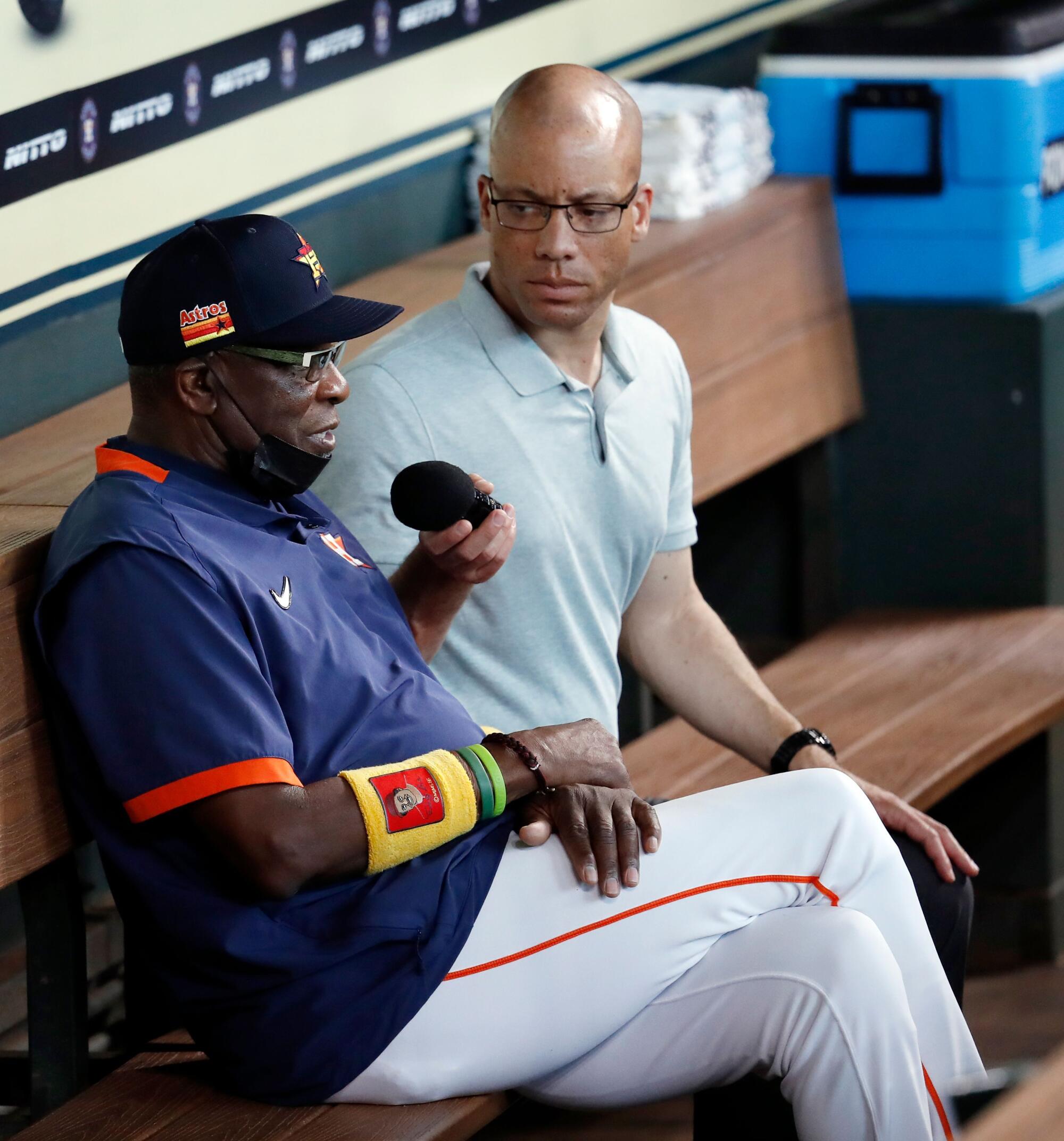
And radio accessibility continues while TV broadcast turmoil unfolds with some regional sports networks — Diamond Sports, the company that owned more than a dozen RSNs under Bally Sports, filed chapter 11 bankruptcy in March, forcing MLB to take over the broadcasts of San Diego Padres and Arizona Diamondbacks games.
“The fact that you can stream games on radio pretty easily and it’s very accessible, I think it makes a big difference and helps basically keep this industry alive,” Ford said.
That isn’t the only reason listening to games resonates with fans. For many, it’s the broadcasters who narrate every sight and know when to let the sounds do the talking, turning baseball’s ordinary into audible art. Angels fans who listened through the 2002 World Series-winning season still remember the “just another Halo victory” tagline that Rory Markas used to say.
The Angels have perhaps one of the most accessible radio broadcasts because they can be listened to online for free outside Southern California. Unlike other radio broadcasts whose access is limited to regional listeners — the Tigers’ radio broadcast, for example, is accessible primarily in Michigan and some parts of Ohio — Angels broadcasts can be heard in places like New York City and Philadelphia.
The Angels have the ability to reach a big radio audience. But for now they don’t appear willing to invest fully in the broadcasts the way most teams do.
Nevertheless, fans like Gonzales continue to tune in.
Markas had also served as the play-by-play voice for the USC men’s basketball team and as a news reporter for KTTV Channel 11.
“I just learned to adapt to finding out what happened seconds later than when we should have found out,” Gonzales said. “I’m used to it now. The thing is, I don’t want the Angels to be known as the team that is cheap enough that they won’t send their radio guys on the road.
“But when there’s only a few teams and you’re one of them, you wonder ‘why’ and ‘how can this be prevented?’” Gonzales continued. “I know the difference now. Especially the crowd noise on the road, it’s more sedated and it doesn’t sound natural, but when they’re here for games in Anaheim, it’s real.”
More to Read
Go beyond the scoreboard
Get the latest on L.A.'s teams in the daily Sports Report newsletter.
You may occasionally receive promotional content from the Los Angeles Times.

